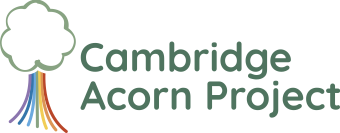We believe in creating change and tacking inequality.
Cambridge Acorn Project offers therapeutic services to children, young people and families, who have experienced trauma and face financial hardship, giving them the chance to talk about anything which may be troubling, or worrying. Our gentle and empathic sessions respond to each individual’s unique circumstances. We believe in supporting people to build on their existing strengths to create change, promote recovery and tackle inequality.
Our charitable missions (Charity No: 1175019) is “to relieve the suffering of children and families in Cambridgeshire and surrounding localities facing trauma or emotional distress by the provision of a therapeutic model of social work”. Currently, more that 80% of our referrals involve historic domestic abuse, and we also work with children, young people and families who have experienced sexual and/or physical abuse, and neglect.
Since our inception in 2014 we have:
provided long-term therapeutic interventions to over 700 children and their families
delivered preventative mental health projects at schools in Cambridgeshire reaching over 1,500 children and young people
developed three community wellbeing hubs for parents and families in Huntingdon, East Cambs and Cambridgeshire to support children and families to get quick access to therapeutic services and support families to have safe homes.
We know that there is a continued and growing need for services such as ours. Learn more about the work we do below. Following the needs of our community, we work at street-level to build resilience and ensure quick access to in-person strengths-based services enabling families to get help on their own terms, in the right way.
Understanding Inequality
Our work is about breaking the cycle of trauma and poverty, tackling inequality stemming from adverse childhood experiences and promoting emotional recovery. We work at the intersection of poverty and childhood trauma, a link well documented in research (Nurius et al., 2016). Our approach strives to create conditions of freedom, safety, opportunity and equality. We believe in building the right kind of relationships that are non-judgemental and that promote freedom and choice. Our charity adopts an academic model of Justice as Action, which unites our thinking and doing. We develop, research and deliver new ideas and project that tackle the effects of trauma and inequality in our communities. Our projects are based on our community’s voice. Our community knowledge is generated through our front-line work as well as through community consultations, researching alongside children to lift-up their voices and also by ensuring community representation within our organisation through our peer-support volunteer programme.
We have adopted a social justice approach to funding that is flexible and responds to individual need. This approach is important because the effects of trauma and abuse are non-linear and differ from child to child. We learnt from listening to children and families during the Covid-19 pandemic that charities and services need to be adaptable, responding to individual’s needs as they change and evolve. In some cases, these needs cannot be met by one charity alone. This new approach to funding allows us to support people through bespoke therapeutic packages made up of our own services and the services of our partners to ensure we use the right tools at the right time. We believe that this holistic method can help tackle inequality and provide better services to children, young people and families.
We are developing a Kumu System, a map that outlines inequality events and traumatic fragments, to demonstrate how a multi-agency approach is needed to address inequality. No single agency is likely to be able to solely provide all the elements of a bespoke package of support to address trauma, inequality and their consequences. At Cambridge Acorn Project, we continually strive to build networks across our communities and work with the community and other agencies to meet children and families’ needs.


